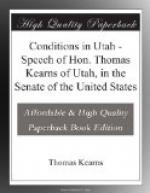Brigham Young succeeded Joseph Smith, and he set up a kind of kingly rulership, not unbecoming to a man of his vast empire-building power. The Mormons have been taught to revere Joseph Smith as a direct prophet from God. He saw the face of the All Father. He held communion with the Son. The Holy Ghost was his constant companion. He settled every question, however trivial, by revelation from Almighty God. But Brigham was different. While claiming a divine right of leadership, he worked out his great mission by palpable and material means. I do not know that he ever pretended to have received a revelation from the time that he left Nauvoo until he reached the shores of the Dead Sea, nor through all the thirty years of his leadership there. He seemed to regard his people as children who had to be led through their serious calamities by holding out to them the glittering thought of divine guardianship. So firmly did Brigham establish the social order in Utah that all of the people were equal, except the governing body. This may be said to consist of the president and his two counsellors, they three constituting the first presidency; the twelve apostles; the presiding bishopric, consisting of three men, the chief bishops of the church but much lower in rank than the apostles; the seven presidents of seventies, who are, under the apostles, the subordinate head of the missionary service of the church; and the presiding patriarch. These altogether constitute a body of twenty-six men. There are local authorities in the different stakes of Zion, as they are called, corresponding to counties in a State, but with these it is not necessary to deal.
Practically all of these men under Brigham Young were polygamists. They constituted what one of their number once called the “elite class” of the community. To attain this rank one usually had to show ability, and attaining the rank he was quite certain to enter into or extend his already existing plural-marriage relations. These rulers were looked upon with great reverence. Brigham Young, besides being a prophet of God, as they believed, had led them through the greatest march of the ages. His nod became almost superhuman in its significance. His frown was as terrible to them as the wrath of God. He upheld all the members of the polygamistic and governing class by his favoritism toward them. He supremely, and they subordinately, ruled the community as if they were a king and a house of peers, with no house of commons. Not elsewhere in the United States, and not in any foreign country where civilization dwells, has there been such a complete mastery of man over modern men. The subordinates and the mass would perform the slightest will of Brigham Young. When he was not present the mass would perform the will of any of the subordinates speaking in his name. Below this privileged class stood the common mass. It had its various gradations of title, but, with the exception of rare instances of personal power,




